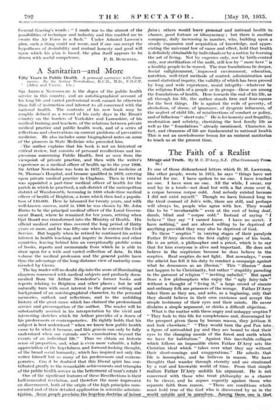A Sanitarian—and More
Fifty Years in Public Health. A personal narratiyo.with Com- ments. By Sir Arthur Newskolme, K.C.B., M.D., F.R.C.P. (Allen and Unwin. 15s.) Silt ARTHUR NEWSHOLISE is the doyen of the public health service in this country, and an autobiographical account of his long life and varied professional work cannot be otherwise than full of instruction and interest to all concerned with the national health. The contents of his new book may he roughly defined as a record of his early days- in the BrontO cOuntry on the borders of Yorkshire and Lancashire, of his medical training and teachers, of the relations between private Medical practice and public health work, and of a series of reflections and observations on current problems of preventive medicine. He also includes some biographical notes on some of the pioneers in State Medicine who preceded him.
:= The author explains that his book is not an historical or critical review, but consists of personal recollections and im- Nessions concerning Public Health, first as seen from the viewpoint of private practice, and then with the writer's esperience as a medical officer of health up'to the year 1908. Sir Arthur Newsholme was born in 1857, studied medicine at St; Thomas's Hospital, and became qualified in 1879, entering upon private medical practice in Clapham. Then in 1884 he was appointed a part-time medical officer of health for the parish in which he practised, a sub-district of the metropolitan district of Wandsworth, becoming in 1888 whole-time medical officer of health of Brighton, a_town which then had a popula- tion of 110,000. Here he laboured for twenty years, and with well-known success, until in 1908 he was chosen by Mr. John ]iiirns to be the principal medical officer of the Local Govern- ment Board, where he remained for ten years, retiring when that Board was transformed into the Ministry of Health. His oljicial medical career thus covered the long period of thirty years or more, and he was fifty-one when he entered the Civil Service. But happily when he retired he continued his active interest in health teaching and inquiry in America and other countries, leaving behind him an exceptionally prolific series or hooks, reports and memoranda from which he is able to draw upon for a wide and varied collection of data. In this volume the medical profession and the general public have thus the advantage of the long-distance view of maturity com- mended by Cicero.
, The lay reader will no doubt dip into the score of illuminating chapters concerned with medical subjects and profusely docu- mented from Sir Arthur Newsholme's former books and reports relating to Brighton and other places ; but he will naturally turn with most interest to the general setting and background of an autobiographical character, to the personal memories, outlook and reflections, and to the unfolding history of the great cause which has claimed the predominant service and preoccupation of the author. The reader will be snbstantially assisted in his interpretation by the vivid and interesting sketches which Sir Arthur provides of a dozen of his predecessors or contemporaries. He rightly holds that his subject is best understood "when we know how public health came to be what it became, and this genesis can only be fully understood when one extends one's examination beyond the eVents of an individual life." Thus we obtain an historic sense of proportion, and, what is even more valuable, a fuller nppreciation of the hopefulness and forward-looking thought, of the broad social humanity, which has inspired not only the writer himself but so many of his predecessors and contem- po. rarics. Can it be doubted that this liberal spirit has con- tributed greatly to the remarkable achievements and triumphs of the public health service in the betterment of man's estate ?
_ One of the significant features of these Recollections is their half-concealed revelation, and therefore the more impressive oh discernment, both of the origin of the high principles corn- nicaded and of their detailed application in scientific adminis- ttion,....4olne pe_ople proclaim thocg fare.; others would leave prisdnal and national health chance, good fortune or idiosyncrasy ; but there is another company, daily increasing in number, who, building upon a steady expansion and acquisition of knowledge, and appre- ciating the universal law of cause and effect, hold that health is definitely obtainable by individuals or by a nation by learning the art of living. Not by eugenics only, nor by birth-control only, nor sterilization of the unfit, still less by " more beer" is a healthy people to be reared. The true foundations lie deeper. Social enlightenment, improved environment, education, nutrition, we1l4rled methods of control, administration and sound statistical inquiry, the validity of which has been proved by long and wide experience, moral integrity—whatever be the religious Faith of a People or its groups—these are among' the foundations of health. Here towards the end of his life, as all through his life, the author stands firm and four-square for the best things. He is against the evils of poverty, of alcoholism, of slums, of ignorance, of dysgenic influences, of the neglect of child life, of misdirections of conduct or policy, and of fallacious" short cuts." He is for honesty and frugality, moderation and sobriety, cherishing the best family life as well as the " foundations " already mentioned. Character, in fact, and cleanness or life are fundamental to national health This is not an unwholesome lesson for an eminent sanitarian to teach us at the present time.


































































 Previous page
Previous page